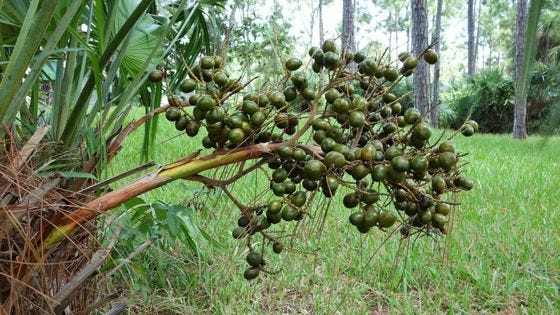PCOS and Saw Palmetto #57
Is Saw Palmetto good for PCOS?
Hello, my lovely people
How was your week?
I have covered many different supplements used for PCOS in this newsletter, but we have not yet discussed Saw Palmetto. I have seen this getting popular amongst the PCOS community, so let’s dissect it and see if there is enough evidence to justify its usage.
What is Saw Palmetto?
Saw palmetto (Serenoa repens) is a small palm tree native to the southeastern United States. It is primarily known for its berries. It seems to look like this 👇🏼
What is it used for?
It seems to have been used in natural medicine for quite some time. In the early 1900s, men used the berries to treat urinary tract problems and even to increase sperm production and boost libido. Today, the primary use of saw palmetto is to treat benign prostatic hyperplasia (BPH), a non-cancerous enlargement of the prostate gland. I love how we went: that bush looks interesting; what happens if I start drinking it?
Research on the above has shown inconclusive results with some potential benefits. However, here at the PCOS Newsletter, we are somewhat interested in ovaries rather than the prostate. But there is a reason why we are speaking about it. The main mechanics of action for Saw Palmetto seems to be anti-androgenic. This is where it gets interesting for PCOS.
Saw Palmetto in PCOS
We know that PCOS is characterised by high androgens (mainly testosterone). Naturally, anything that can help us decrease the levels of androgens becomes of interest for the management of PCOS.
It does this by blocking certain enzymes (5α-reductase I and II) that convert testosterone into a more potent form called dihydrotestosterone (DHT), and by stopping DHT from attaching to and activating receptors in cells. However, this has only been studied in men.
Unfortunately, there is no evidence of this for women with PCOS. The only study existent on the use of saw palmetto for PCOS is one done in rats. This study shows promising results, but no studies on humans have yet been undertaken.
I am not saying it could not work, but I wouldn’t personally recommend a supplement with so little evidence when there are plenty of others that do. (A review of supplements for PCOS is coming in the upcoming newsletters.)
I believe in natural medicine. There are many things that our ancestors have used that we might not have had the chance to investigate. If you want to try it, please go ahead. I want you to know what level of evidence there is and to ensure you understand that these are not miracle pills. Also, please be mindful of what manufacturer you buy from to ensure you don’t do more harm than good.
Conclusion
Whilst doing research for this I encountered so many blogs promoting it. On one hand, it worries me to see the levels of confidence some people have when promoting something they know so little about. On the other hand, it fuels me. There is a need for more scientific backed information out there and I hope you are getting this from The PCOS Newsletter.
See you next Sunday,
Francesca
1 Sources
Grant, P., & Ramasamy, S. (2012). An Update on Plant Derived Anti-Androgens. International Journal of Endocrinology and Metabolism, 10(2), 497–502. https://doi.org/10.5812/ijem.3644
Kwon, Y. (2019). Use of saw palmetto (Serenoa repens) extract for benign prostatic hyperplasia. Food Science and Biotechnology, 28(6), 1599–1606. https://doi.org/10.1007/s10068-019-00605-9
Suzuki, M., Ito, Y., Fujino, T., Abe, M., Umegaki, K., Onoue, S., Noguchi, H., & Yamada, S. (2009). Pharmacological effects of saw palmetto extract in the lower urinary tract. Acta Pharmacologica Sinica, 30(3), 271–281. https://doi.org/10.1038/aps.2009.1
Ullah, A., Jahan, S., Razak, S., Pirzada, M., Ullah, H., Almajwal, A., Rauf, N., & Afsar, T. (2017). Protective effects of GABA against metabolic and reproductive disturbances in letrozole induced polycystic ovarian syndrome in rats. Journal of Ovarian Research, 10(1). https://doi.org/10.1186/s13048-017-0359-7
Disclaimer: We are all unique in our ways, so this information is for educational purposes only. In my communications, I summarise research data and bring my experience. This shouldn’t be viewed as medical advice at any point. Please further consult your healthcare provider about your health needs.


